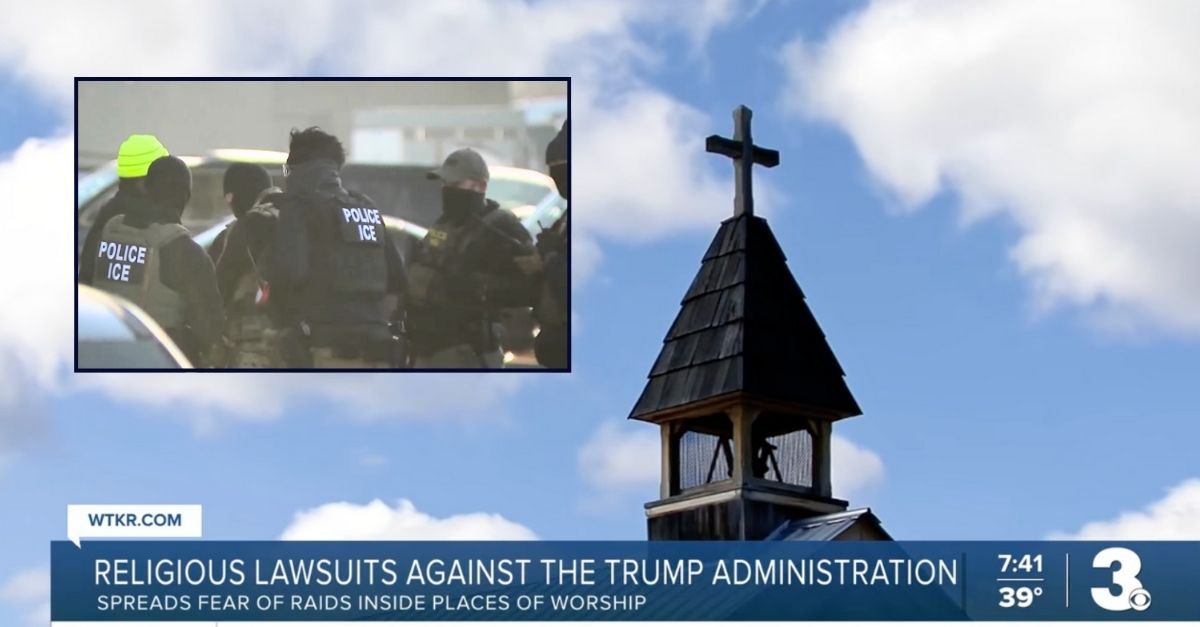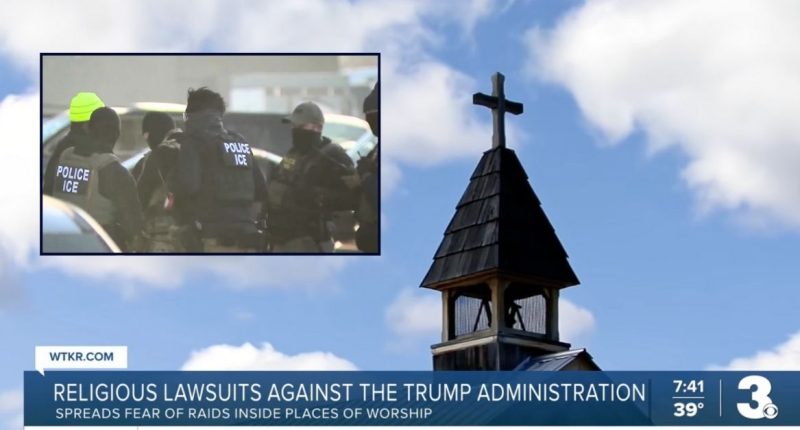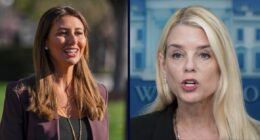
Inset: Immigration and Customs Enforcement agents in Denver, Colorado (KDVR/YouTube). Background: A church in Virginia (WTKR/YouTube)
The Trump administration has been blocked from enforcing its updated 2025 immigration policy at houses of worship for Cooperative Baptists, Quakers and Sikhs — with a judge in Maryland issuing a limited preliminary injunction Monday as religious groups across the country fight to keep federal enforcers away from their congregations.
“Armed law enforcement officers operating in or at places of worship pursuant to the 2025 policy will adversely affect the ability of Quakers and Sikhs to follow their religious beliefs or worship freely,” wrote U.S. District Judge Theodore Chuang in a 59-page opinion.
“And given that each of Plaintiffs has religious beliefs that cause them to welcome and serve immigrants, has significant immigrant membership or operates in communities with significant immigrant populations, and has not disavowed that they will continue to serve immigrants both with and without legal status, it is reasonable to expect that DHS will direct immigration enforcement toward Plaintiffs specifically,” Chuang said.
The Barack Obama appointee is overseeing a case between Donald Trump’s Department of Homeland Security and groups representing the Cooperative Baptist Fellowship (CBF), Quakers and Sikh Temple in major cities like New York, Baltimore and Sacramento. The groups have filed a lawsuit claiming that carrying out immigration enforcement at their worship locations violates their First Amendment right to the free exercise of their respective religions.
Over two dozen Christian and Jewish groups teamed up earlier this month to file a similar lawsuit in federal court to protect their houses of worship from Trump’s updated immigration enforcement policies, which now allow enforcement in schools and churches, places that were previously designated as “protected areas” by Joe Biden’s administration.
Chuang’s preliminary injunction bars the Trump administration from carrying out its policy at certain houses of worship for Quakers, CBF members and Sikhs only while their lawsuit is weighed. Chuang noted in his opinion how each group laid out specific reasons in a TRO motion filed earlier this month, and he ultimately agreed that immigration agents should stay away from their services and buildings.
“Plaintiffs all serve immigrant communities, including undocumented immigrants,” the judge said. “Several of the Quaker Plaintiffs have a large number of immigrant worshippers, provide services to immigrants, or are located among large immigrant populations. CBF has congregations with large numbers of immigrants and specifically provides services to immigrants and refugees; and approximately half of the Sikh Temple’s congregation consists of immigrants, including undocumented members.”
According to Chuang, the three groups all successfully affirmed that their respective religious beliefs include “welcoming and encouraging all to attend their services.” He said that the Quakers attested in the motion that pacifism is “deeply ingrained in the Quaker faith,” such that having weapons or “armed people” in or around religious gatherings is “inconceivable and contrary to our faith,” per the complaint.
“Similarly, the Sikh Temple attests that, in light of a history of military assaults on Sikh Gurdwaras, the potential for intrusions by armed government personnel pursuant to the 2025 Policy ‘will impair Sikhs’ ability to practice our faith freely, openly, and without concern,”” Chuang said.
More from Law&Crime: 11-year-old girl kills herself after 6th grade classmates allegedly bully her about immigration status, threaten to call ICE to have parents deported
The lawsuits filed by the Christian and Jewish groups earlier this month declare that the plaintiffs — while religiously diverse — are “unified on a fundamental belief: Every human being, regardless of birthplace, is a child of God worthy of dignity, care, and love.” Their 80-page complaint says, “Welcoming the stranger, or immigrant, is thus a central precept of their faith practices.”
The central concept of that lawsuit is that President Donald Trump’s hard-line immigration enforcement policies infringe on the groups’ religious freedom in that it interferes with their ability to serve their respective congregations. The complaint argues that places of worship have historically been considered “sensitive locations” by DHS and ICE, and as such, would only be invaded in a narrow set of circumstances. The plaintiffs say they are seeing decreased worship attendance due to fear of immigration enforcement actions.








